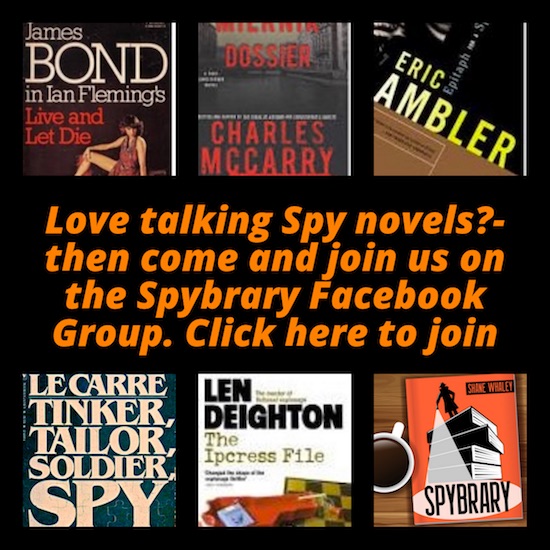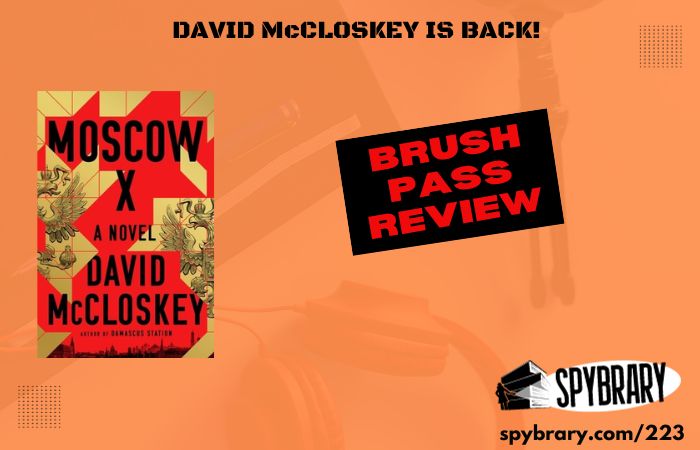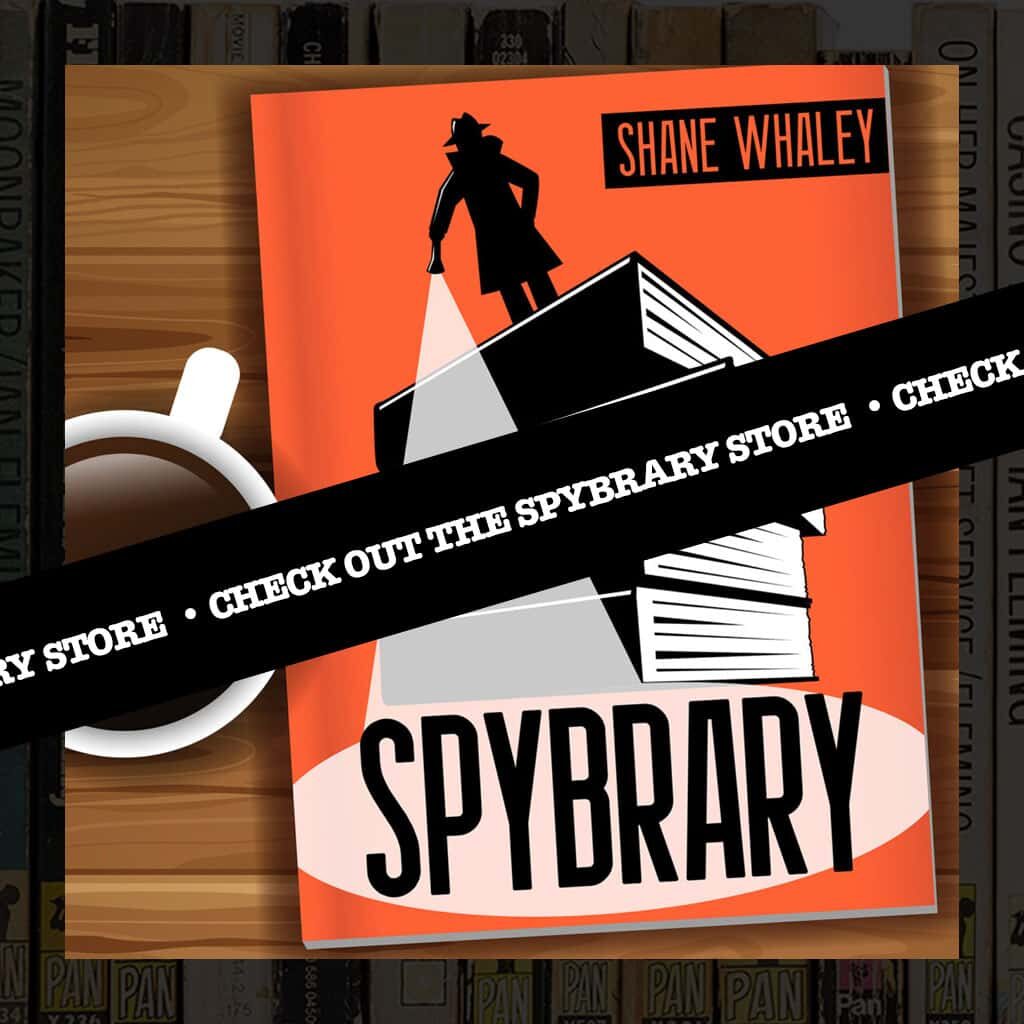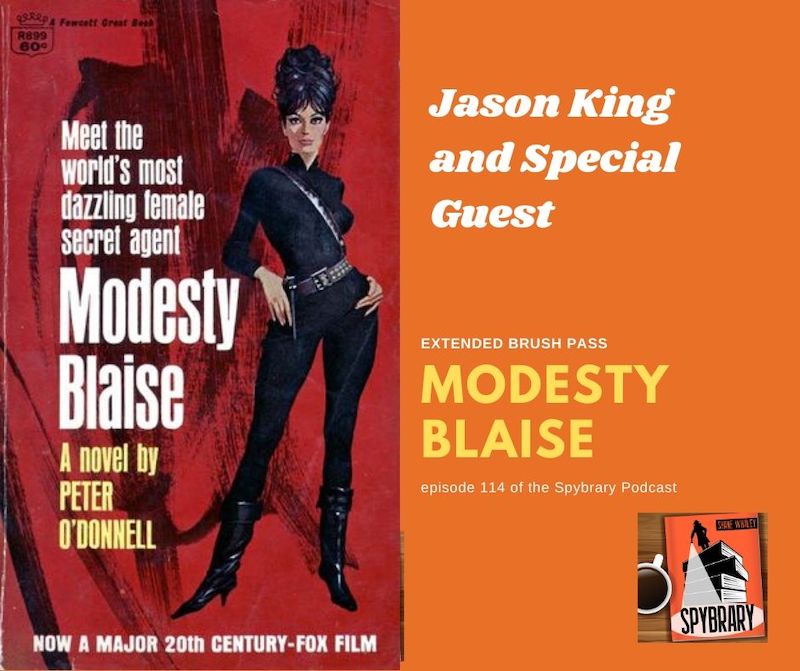
Today we decode an extended brush pass transmission sent in by Jason King and a very special guest. Jason gives us the lowdown on Peter O'Donnell's Modesty Blaise
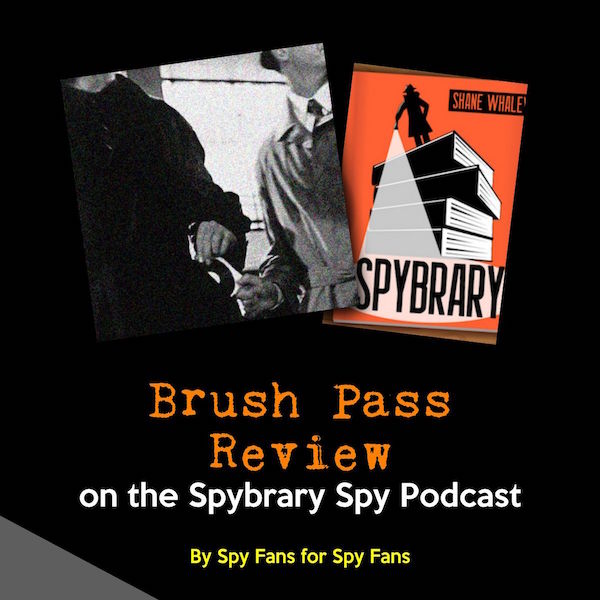
Welcome to Spybrary. By spy fans for spy fans. With Shane Whaley. Shane dives into the mystery and intrigue of spy books and movies. Both fact and fiction, delivering reviews and interviews with authors, historians, intelligence experts and spy fans. He discusses everything from John Le Carre, Len Deighton, Ian Fleming, Tom Clancy, Brad Thor, and many more. If you love spy books and movies, keep listening. This podcast is for you. This is Spybrary.
It's a Brush Pass quick and simple. You are listening to Brush Pass on Spybrary, quick reviews sent in by spy fans for spy fans.
Hello, Spybrarians, this is Jason King, Department S, reporting in the station V with a Brush Pass review on Modesty Blaise.
Oh Jason, darling, do we have to work?
Yes.
Can't we?
Yes, we have to work now, Jessica, not now darling. Not now. Okay, I'm a sconce tear in lockdown with Jessica Tufruit. My capable assistant. Jessica will be making me a cocktail while I share with you the benefits of the late great Peter O'Donnell's Modesty Blaise franchise. Why Modesty Blaise you might ask. Well, for me, Modesty Blaise has always been the real successor to the Bond franchise. If you look at her debut, the Sunday Times critic, Raven Mortimer, said “What every man would like to be and what every woman would like to have between her sheets”. That's how he described James Bond. Modesty Blaise came along and completely turned that on its head and behind the creation of Modesty Blaise.
Is a very special story. The story of the author, Peter O'Donnell himself. Peter was born in England, the son of a fleet street crime correspondent on April 11th, 1920. But by the time he'd reached the tender age of 17, he'd already joined the writing profession with amalgamated press. He was employed to write 20,000 words a week in the form of Western, detective, or comic stories. As you might imagine, it was indeed the school of hard knocks. Years later, O'Donnell used to recount the time when he approached one editor for guidance. Evidently the man in question was sitting with his feet on his desk, reading a newspaper. When asked for advice, he looked up and he said, “Look, you're supposed to be an author, the F off an auth”. So auth he did and to very good effect. After pausing to fight in World War II, O'Donnell returned to his writing career.
And in 1962, whilst writing the Goth Script of The Daily Mirror, he was approached by the then editor of The Daily Express and asked if he could create a heroine suitable for the new decade. It took a O'Donnell nine months of painstaking work to respond to the request. And during this time his thoughts turned to a young refugee girl whom he'd encountered in Persia during the war and who he never forgot. Inspired by that girl's courage and by imagining what might have happened to her, he fantasized that she had risen from refugee status to become head of a criminal syndicate. He named her Modesty when one day he mistyped modestly and Blaise after Merlin's tutor in the Court of King Arthur. He fleshed out the scenario by giving her a partner in crime, a Cockney named Willie Garvin a man who'd been a French Legionnaire and who Blaise takes out of the gutter and grooms to be a sophisticated man of the world.
Gavin has a special relationship with Blaise. Although platonic in nature, theirs is a huge partnership of equals based on total loyalty and respect. Willie is closer to her than anyone else. He calls her princess and is the only one permitted to do so where everybody else she has mademoiselle or Ms. Blaise. Having retired to the UK from their Tangiers based crime syndicate, The Network, they were living the life deluxe and although young, extremely wealthy, and with a multiplicity of interests, they have bored and missed the action. This is when they start to freelance for the head of MI6 a certain Sir Gerald Tarrant. This is the concept that O'Donnell presented to The Daily Express at their behest. And this is the concept that was promptly turned down. Evidently, The Express found the idea of ex-criminals as heroes too morally ambiguous for their righteous leaders and thought Blaise, altogether, too racy. Difficult to understand from the paper that had actually serialized Dr. No, the Ian Fleming novel, as a comic strip, but there you go.
Happily, however, the editor of the London Standard, Charles winter, had better sense. He went straight ahead and commissioned it. Superbly drawn by Jim Holdaway, the strip made its debut in May 13, 1963. It was an immediate success. Blaise was on her way. The comic strip was quickly syndicated internationally and British Lion Films, the UK's biggest production company, bought the movie rights. Their idea was that O'Donnell would write the script and would produce a novelization to support its launch. The initial talk was of Julie Christie playing Blaise and Michael Kane being cast as Willie Garvin. Exciting ideas that more than had O'Donnell's very enthusiastic support. After all, what could possibly go wrong? Fleming's Bond franchise had benefited enormously from Dr. No, the movie. Date and Zip Chris Farr was in production.
This was definitely the way to go. For O'Donnell and spy fans, the result was both good and bad. The positive was that a O'Donnell's novel, simply titled Modesty Blaise, was truly excellent. Published in 1965, preceded the movie by a year. The negative concerned the script adaptation after making the rights deal British Lion Films had fallen on hard times and sold them onto Joseph Janney. The results released in 1966 for no similarity whatsoever to O'Donnell's script or characters. It proves to be one of the greatest missed opportunities in cinematic history and can best be described the complete travesty of the original concept. Directed by Joseph Losey, It was a camp spoof starring in Monica Vitty and Terrance Stamp. Not only did it fail to raise a laugh, it had Blaise fans, including this broadcaster, storming out of the cinemas in disgust. Had the sequencing being different and had the movie arrived before the book, Losey's abomination could well have dashed O'Donnell's dreams of turning Blaise into a literary franchise.
Imagine a situation of 1967 spoof version of Casino Royal had appeared before Fleming's novel. Bond would have been strangled at birth. Happily, this was not the case for O'Donnell. The novel, Modesty Blaise, was an immediate success in hardback. And when Pan published the paperback in '66, it became one of the biggest sellers of the year. The critical acclaim was unanimous. One of the great partnerships in crime fiction, burying comparison without a Sherlock Holmes and Dr. Watson, a pined Kingsley Amos. These books are the finest escape thrillers ever written at the times. Modesty Blaise licensed to thrill The Sun. O'Donnell's ironic heroin has dropped kicked away through a [inaudible 00:10:07] the villains and into a unique place in popular culture, the Observer. Over the next 30 years, Peter O'Donnell was to bring us a total of 11 splendid, full length novels, and two collections of short stories before bringing things to a heartbreaking close in 1996's Cobra Trap.
Among the best books in the series was Saber Tooth published in 1966. A Taste for Death, published in '69. The Silver Mistress '73, and The Night of the Morning Star in '82. Comparisons with Ian Fleming's work were many and varied. Clearly they both shared the same subject matter and O'Donnell's novels feature the same restless changing of scenes. The same preoccupation with exotic locations. And if anything, even a greater focus on the branded life deluxe. There was also some very depth plotting featuring an ingenious array of sinister criminal masterminds that more than equaled anything from Fleming. From a pair of male fisted, killer Siamese twins, to the nymphomaniac, Clarissa Courtney Scott, she of the sharp and bicycle spoke. Oh, O'Donnell delivered barking mad villains that shivered your timbers. But there was a significant difference. 1960 was the year of The Who's My Generation and O'Donnell's debut was bang on for those times. Whilst Modesty's charms attracted male readers, her independence and sexual autonomy rapidly made her a role model for young women, especially those looking to have careers of their own.
This was real feminism, 1960's style. O'Donnell's capacity to get inside the female psyche was unrivaled and was demonstrated by the way he expressed every dimension of her character right down to the care he took in dressing and accessorizing Blaise. Indeed he was so good at portraying women. When he wasn't writing Blaise books, he was moonlighting as Madeline Bell and writing Gothic historical romance novels in the first person. The fact that the two principal protagonists were also shining examples of social mobility also represented a stark contrast to the Eaton educated bond and his Clubland cohorts. Blaise and Garvin were more likely to be found in Annabelle's than [inaudible 00:13:27]. O'Donnell's novels also featured action at a cinematic level. An off term comment from readers of the Fleming novels was that they lacked the pace of the movies. By comparison, the Blaise novels were relentless.
They featured some of the most exciting, bone crunching hand to hand combat scenes ever written. O'Donnell's fascination with unusual weaponry also made for great reading, whether it was Modesty's preference for using the congo, a hand held wooden club, or Willie's [inaudible 00:13:55] for throwing knives, or the gadgets they fashioned in the workshop at the back of Garvin's treadmill pub. Their expertise with armaments made 007's PPK and Q branch look a little dad's army. Another difference with Fleming was also O'Donnell's depth of characterization. The books were ensemble pieces featuring a cast of recurring characters that readers learn to love. There was a real warmth to them that serve to heighten the sense of jeopardy when he put them in danger. Over and above all of this, many thriller aficionados consider that Peter O'Donnell was just a better writer than Fleming. These things are always highly subjective, and I'm a huge Fleming fan.
But few who are read both sets of work would suggest that he was anything less than his equal. Unfortunately, Blaise's stellar literary and comic strip success was never translated to the screen. During the '70s, Diana Rigg offered to develop Blaise as a UK TV franchise with her in the lead. The proposal was met with initial enthusiasm by O'Donnell, but he called on the idea when Adam Faith was proposed as Garvin. This may have been a missed opportunity. Rigg is and was a fine actor, and had already proved her action chops in the Avengers. That said, proposing at the five-foot-five ex-pop star as Willie was also always going to require a leap of faith. Other than that, there was a dismal American '80s TV pilot that went nowhere followed by the hiatus in the early '90s when O'Donnell sold the screen rights to Miramax for a limited period.
Evidently, this was on the strength of interest by Quintin Tarantino. Despite two scripts being developed, one based on Modesty Blaise, the other one I Lucifer. It too, came to nothing with the exception of a low budget, straight to DVD piece, My Name is Modesty, that was rushed out to stop the rights lapsing. To be fair, My Name is Modesty is not a bad job and for aficionados that haven't seen it, I'd encourage them to seek it out. The influence Modesty Blaise is to be found in a multiplicity of Hollywood projects, however. The likes of Nikita, Kill Bill, Hannah Haywire, and even the more recent Atomic Blonde all are pieces of a O'Donnell's creation scattered throughout. Yet some of the most cinematic books ever written and the film franchises that could truly challenge Bond remains unexploited.
Peter O'Donnell passed away in 2010 at his home in Brighton at the ripe old age of 90. His affection for Blaise, Garvin, and their band of brothers stayed with them to the very end. His wish was that nobody else should write about them. So we've been saved the [inaudible 00:17:22]of the continuation novel. Frankly, nobody could. He was the complete master and his wish should be respected. He once said in an interview, “It's simple, I write from the guts about characters I love”. He certainly did, and should be remembered as a great storyteller, who was the true master of the spy fantasy genre.
Post O'Donnell, little has really happened in the spy fantasy world. We've had Adam Diment's creation, Phillip McAlpine, and a couple of other things, but the trend has been relentlessly towards the more serious aspects of the spy business. Perhaps after the favorites, COVID-19 virus we'll have the appetite again to return to a more glamorous, carefree age when people just want to have fun and they can let their imagination run riot. And in anticipation of that, I would encourage every spybrarian to seek out O'Donnell's best novel, Saber Tooth, and try it for themselves. I'm sure that you'll be impressed. And I look forward very much to your feedback. So this is Jason King, over and out from department S in the Surrey Hills. It's nearly cocktail hour and I'm looking forward to welcoming Ms. Tufruit back. Bye.
Can you pull off a Brush Pass? Send in your review to Shane@spybrary.com.
Thanks for listening to the Spybrary podcast. You don't have to wait for the next episode, join the conversation happening now at facebook.com/Spybrary and on Twitter @Spybrary.
Brush Pass reviews are not literary criticism. Imagine telling a friend about a book you just read and why they should (or should not) read it. Record it on your phone and email it over to me. Brush Pass Spy Book reviews are some of our most popular episodes, why not give it a try and send us one in?
- The Spybrary Facebook Group – tell us what you thought of today's Brush Pass about Modesty Blaise.
- Books written by Peter O'Donnell.
- Want to give Modesty Blaise a try? Jason recommends Sabre Tooth.
- Quentin Tarantino's Modesty is My Name movie
- Modesty Blaise was something like Wonder Woman meets James Bond—but she was so much more, too. The Atlantic CAITLIN FLANAGAN
- Modesty Blaise and Peter O’Donnell and the Last Great Adventure Strip (The Comic Journal.)
- In Praise of Modesty Blaise.
